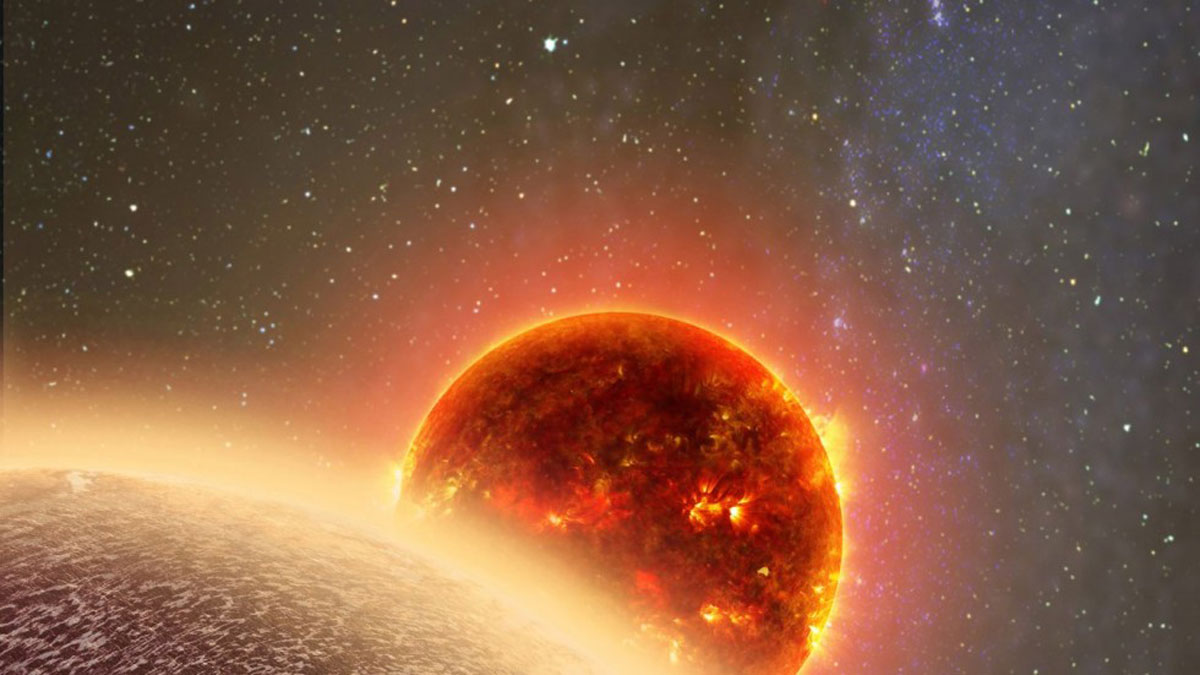GJ 1132b – what do we know about Earth-like planet?
Newly discovered planet could be most important world outside the solar system

A free daily email with the biggest news stories of the day – and the best features from TheWeek.com
You are now subscribed
Your newsletter sign-up was successful
An Earth-sized planet close enough for scientists to observe with telescopes could prove to be instrumental in learning more about the worlds beyond our solar system.
GJ 1132b, which is 39 light-years away from Earth, was spotted by robotic telescopes at the Cerro-Tololo Inter-American Observatory in Chile. The powerful telescopes detected a miniscule change in starlight as the planet orbited around its host star, a small red dwarf.
An initial description of the planet in the latest edition of the journal Nature reveals that, like the Earth's moon, GJ 1132b is tidally bound to its host star, so it keeps one face permanently turned to the light while the other half remains in darkness. The planet is similar to Earth in size and mass but orbits far closer to its host star than the Earth does to the Sun, meaning a scalding temperature of around 260C – or, as the report's co-author Zachory Berta-Thompson summarises it, "burnt-cookie hot".
The Week
Escape your echo chamber. Get the facts behind the news, plus analysis from multiple perspectives.

Sign up for The Week's Free Newsletters
From our morning news briefing to a weekly Good News Newsletter, get the best of The Week delivered directly to your inbox.
From our morning news briefing to a weekly Good News Newsletter, get the best of The Week delivered directly to your inbox.
Such intense heat rules out the possibility of water or intelligent life being found on the planet. Crucially, however, this temperature is not high enough to burn off the planet's atmosphere, thereby providing a fertile ground for astronomers to study. Specifically, researchers believe that the planet is close enough to detect the colour of its sunsets and its wind speeds.
Berta-Thompson spelt out just how important the new discovery could be for the future of space exploration. "If this planet still has an atmosphere, then we might find other, cooler planets that also have atmospheres and orbit small stars. We can then imagine interrogating the atmospheres for molecules that come from life," he said.
"Our ultimate goal is to find a twin Earth, but along the way we've found a twin Venus," Dr David Charbonneau, from the Harvard-Smithsonian Center for Astrophysics, told the Daily Telegraph. Charbonneau predicted that the new planet's atmosphere would resemble that of Venus, which is dense, hot and sulphuric.
Answers to scientists' questions could come sooner rather than later, with the scheduled 2018 launch of the James Webb Space Telescope raising hopes that the instrument could be used to find out more about the planet's composition and atmosphere.
A free daily email with the biggest news stories of the day – and the best features from TheWeek.com
-
 What to know before filing your own taxes for the first time
What to know before filing your own taxes for the first timethe explainer Tackle this financial milestone with confidence
-
 The biggest box office flops of the 21st century
The biggest box office flops of the 21st centuryin depth Unnecessary remakes and turgid, expensive CGI-fests highlight this list of these most notorious box-office losers
-
 The 10 most infamous abductions in modern history
The 10 most infamous abductions in modern historyin depth The taking of Savannah Guthrie’s mother, Nancy, is the latest in a long string of high-profile kidnappings
-
 Nasa’s new dark matter map
Nasa’s new dark matter mapUnder the Radar High-resolution images may help scientists understand the ‘gravitational scaffolding into which everything else falls and is built into galaxies’
-
 Moon dust has earthly elements thanks to a magnetic bridge
Moon dust has earthly elements thanks to a magnetic bridgeUnder the radar The substances could help supply a lunar base
-
 How Mars influences Earth’s climate
How Mars influences Earth’s climateThe explainer A pull in the right direction
-
 The ‘eclipse of the century’ is coming in 2027
The ‘eclipse of the century’ is coming in 2027Under the radar It will last for over 6 minutes
-
 NASA discovered ‘resilient’ microbes in its cleanrooms
NASA discovered ‘resilient’ microbes in its cleanroomsUnder the radar The bacteria could contaminate space
-
 Artemis II: back to the Moon
Artemis II: back to the MoonThe Explainer Four astronauts will soon be blasting off into deep space – the first to do so in half a century
-
 The mysterious origin of a lemon-shaped exoplanet
The mysterious origin of a lemon-shaped exoplanetUnder the radar It may be made from a former star
-
 The 5 biggest astronomy stories of 2025
The 5 biggest astronomy stories of 2025In the spotlight From moons, to comets, to pop stars in orbit